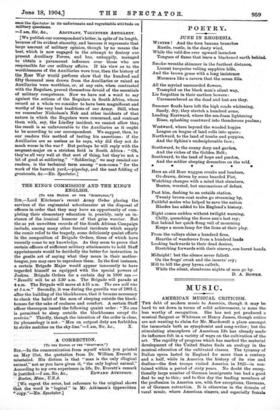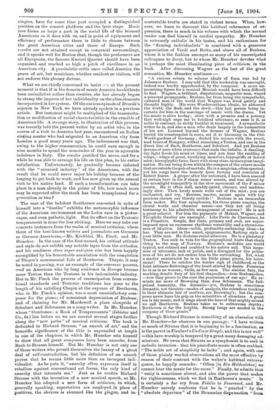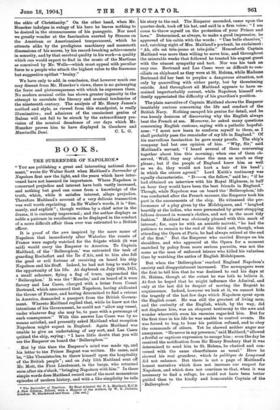M USIC.
AMERICAN MUSICAL CRITICISM.
THE debt of modern music to America, though it may be hard to set down in terms of solid achievement, is none the less worthy of recognition. She has not yet produced a musical Sargent or Whitman or Henry James, though critics are not wanting to claim for Mr. Macdowell a place amongst the immortals both as symphonist and song-writer; but the stimulating atmosphere of American life has already made its influence felt in a variety of ways on the cultivation of the art. The rapidity of progress which has marked the material development of the United States finds an analogy in the musical education of the cultivated classes. The tyranny of Italian opera lasted in England for more than a century and a half, while in America the history of its rise and decline—the first troupe visited America in 1825—is con- tained within a period of sixty years. No doubt the excep- tionally large number of German immigrants has had a good deal to say to this ; and to this day the leading members of the profession in America are, with few exceptions, Germans, or of German extraction. It is otherwise in the domain of vocal music, where American singers, and especially female
singers, have for some time past occupied a distinguished position on the coneert platform and the lyric stage. Music now forms as large a part in the social life of the leisured. Americans as it does with us, and in point of equipment and efficiency of performance there is little to choose between the great American cities and those of Europe. Such results are not attained except in congenial surroundings, and it speaks well for Boston that, though the performers are all Europeans, the famous Kneisel Quartet should have been organised and reached so high a pitch of excellence in an American city. A pessimistic critic once called America the grave of art, but musicians, whether resident or visitors, will • not endorse this gloomy dictum.
What we are chiefly concernedto insist c-1 at the present moment is that if in the domain of music America has hitherto been assimilative rather than creative, she has already begun to stamp the impress of her individuality on the alien elements incorporated in her system. Of the curious episode of Dvorak's sojourn in New York we have already spoken in a previous article. But instances might be multiplied of the transmuta- tion or modification of racial characteristics in the crucible of American life. A strange story, in illustration of this process, was recently told the present writer by an artist who, in the course of a visit to America last year, encountered- an Italian singing master who had migrated to an American city from London a good many years ago. The inducement was that, owing to the higher remuneration, he could earn enough in nine months to spend the remainder of the year in agreeable indolence in Italy. The results justified the move, and for a while he was able to arrange his life on this plan, to his entire satisfaction. Unfortunately, he gradually became infected with the "accursed industry" of the Americans, with the result that be could never enjoy his holiday because of the longing to get back to work, and has now given up the annual visit to his native land. If such a transformation can take place in a Man already in the prime of life„ how much more may be expected after the stock has been transplanted for a generation or two The case of the indolent Southerner converted in spite of himself into a "hust]er" exhibits the metamorphic influence of the American environment on the Latin race in a pictur- esque, and even pathetic, light. But its effect on the Teutonic temperament is none the less striking. Here we may take our concrete, instances from the realm of musical criticism, where three of the best-known writers and journalists are Germans or German-Americans,--Mr. Krehbiel, Mr. Finck, and Mr. Huneker. In the case of the first-named, his critical attitude and style do not exhibit any notable lapse from the orthodox, and his readiness stare super antiguas vias has been happily exemplified by his honourable association with the completion of Thayer's monumental Life of Beethoven. Thayer, it may be noted in passing, was an example of the converse process, —of an American who by long residence in Europe became more Teuton than the Teutons in his indomitable industry. But in Mr. Finck the process of emancipation from conven- tional standards and Teutonic traditions has gone to the length of his extolling Chopin at the expense of Beethoven, who, in Mr. Finck's opinion, was a most unsatisfactory com- poser for the piano; of consistent depreciation of Brahma; and of claiming for Mr. Macdowell a place alongside of Schubert and Schumann as a song-writer. In Mr. Huneker, whose " Overtones : a Book of Temperaments" (Isbister and (Jo., 69.) lies before us, we are carried several stages further along the "new paths" of musical criticism. The book is dedicated to Richard Strauss, "an anarch of art," and the honorific significance of the . title is expounded at length• in one of the chapters, in which Mr. Huneker seta himself to show that all great composers have been anarchs, from Bach to Strauss himself. But Mr. Huneker is not only one of those writers who permit themselves the luxury of a great deal of self-contradiction, but his definition of an anarch proves that he means little more than an insurgent indi- vidualist. As be puts it, "anarchy often expresses itself in rebellion against conventional art forms, the only kind of anarchy that interests me." Just as he credits Richard Strauss with the invention of a new musical speech, so Mr. Huneker has adopted a. new form of criticism, in which, generally speaking, superlatives are employed in place of positives, the obvious is shunned like the plague, and in-
contestable truths are stated in violent terms. When, how- ever, we learn to discount this habitual vehemence of ex- pression, there is much in his volume With which the normal reader can find himself in cordial sympathy. Mr. Huneker is extremely catholic in his tastes, and his enthusiasm for the "flaming individualists" is .combined with a generous appreciation of Verdi and Boito, and above all of Brahma, whom it is the fashion amongst so many of his emancipated colleagues to decry, but to whom Mr. Huneker devotes what is perhaps the most illuminating piece of criticism in the book. After discussing Wagner as the last of the great romantics, Mr. Huneker continues :—
"A curious return to soberer ideals of form was led by Johannes Brahms. I may add that this leadership was unsought,
indeed was hardly apprehended, by the composer. A more un- promising figure for a musical Messiah would have been difficult to find. Wagner, a brilliant, disputatious, magnetic man, waged
a personal propaganda; Brahms, far from being the sympathetic, cultured man of the world that Wagner was, lived quietly and thought highly. His were Wordsworthian ideals; he abhorred the world, the flesh, and the devil,—this last person being in- carnate for him in the marriage of music with the drama. Yet his music is alive to-day; alive with a promise and a potency that well-nigh urge me to fatklical utterance, so sane is it, BO noble in contrast, so richly fruitful in treatment. A sympathetic writer he is, and also a man who deals largely in the humanities of his art. Learned beyond the dreams of Wagner, Brahms buried his counterpoint in roses, set it to blooming in the Old- World gardens of Germany ; decked his science with the sweet, mad tunes of Hungary, withal remaining a Teuton, and one in the direct line of Bach, Beethoven, and Schubert. And yet Brahma dreams of pure white staircases that scale the infinite. A dazzling, dry light Hoods his mind at times, and you hear the rustling of wings,—wings of great, terrifying monsters, hippogriffs of horrid mien; hieroglyphic faces, faces with stony stare, menace your imagi- nation. He can bring down within the compass of the octave moods that are outside the pale of mortals. He is a magician, often spectral; yet his songs have the homely lyric fervour and concision of Robert Burns. A groper after the untoward, I have been amazed at certain bars in his F sharp minor sonata, and was stirred by the moonlight tranquillity in the slow movement of the F minor sonata. He is often dull, muddy-pated, obscure, and madden- ingly slow. Then lovely music wells out of the mist; you are enchanted, and cry, Brahma, master, anoint again with thy precious chrism our thirsty eyelids !' Brahms is an inexorable form maker. His four symphonies, his three piano sonatas, the choral works and chamber music—are they not all living testimony to his admirable management of masses ? He is not a great colorist. For him the pigments of Makart, Wagner, and Theophile Gautier are unsought. Like Puns de Chavannes, he is a Primitive. Simple, flat tints, primary and cool, are super- imposed upon an enormous rhythmic versatility and a strenuous- ness of ideation. Ideas—noble, profundity-embracing ideas—he has. They are not in the smart, epigrammatic, flashing style of your little man. He disdains racial allusions. He is a planetary Teuton. You seek in vain for the geographical hints that chain Grieg to the map of Norway. Brahms's melbdies are world typical, not cabined and confined to his native soil. This large- ness of utterance, lack of polish, and a disregard for the polite- ness of his art do not endear him to the unthinking. Yet, what a master miniaturist he is in his little piano pieces, his inter- mezzi! There he catches the tender sigh of childhood, or the faint intimate flutterings of the heart stirred by desire. Feminine he is as is no woman; virile, as few men. The sinister fury, the mocking, drastic fury of his first rhapsodies,—true Brahmsodies, —how they pierce to the core the pessimism of our age! He re- minds me more of Browning than does Schumann. The full- pulsed humanity, the dramatic—yes, Brahma is sometimes dramatic, not theatric—modes of analysis, the relentless tracking to their ultimate lair of motives, are Browning's ; but the com- poser never loses his grip on the actualities of structure. A great sea is his music, and it sings about the base of that mighty mount we call Beethoven. Brahma takes us to subterrene depths ; Beethoven is for the heights. Strong lungs are needed in the company of these giants."
Though Richard Strauss is something of an obsession with Mr. Huneker—he observes in one passage : "I have written so much of Strauss that it is beginning to be a fascination, as is the parrot in Flaubert's Un Cceur Simple, and this is not well"
—this hero-worship is tempered by a great many damaging ad- missions. He owns that Strauss as a symphonist is to seek in melodic invention : that his pianoforte music is often crabbed. "The noble art of simplicity he lacks "; and again, with one of those plainly worded observations all the more effective by reason of their contrast with the writer's habitual extrava- gance, he happily remarks : "Often [in Bin Heldenleben] we cannot hear the music for the score." Finally, he admits that "unity is sometimes absent, and also the power that makes
for righteousness, which we find in Beethoven's music" It is certainly, a far cry from Fidelio to Feuersnot, and Mr.
Huneker naively confesses that he is "puzzled" by the "absolute departure" of the Straussian dispensation "front
the ethic of Christianity." On the other hand, when Mr. Huneker indulges in eulogy of his hero he leaves nothing to be desired in the strenuousness of his panegyric. Nor need we greatly wonder at the fascination exerted by Strauss on the American or Americanised temperament, which he attracts alike by the prodigious machinery and mammoth dimensions of his scores, by his record-breaking achievements in sonority, and by that cerebral quality in his work—a quality which one would expect to find in the music of the Martians as conceived by Mr. Wells—which must appeal with peculiar force to a people who attach the highest value to the fearsome but suggestive epithet "brainy."
We have only to add, in conclusion, that however much one may dissent from Mr. Huneker's views, there is no gainsaying the force and picturesqueness with which he expresses them. No modern musical critic has shown greater ingenuity in the attempt to correlate the literary and musical tendencies of the nineteenth century. The analysis of Mr. Henry James's method and style, as viewed from this standpoint, is really illuminative ; and admirers of the omniscient genius of Balzac will not fail to be struck by the extraordinary pre- vision of the musical decadence of our days which Mr. Huneker proves him to have displayed in Gainbara and Maseimilla Doni. C. L. G.








































 Previous page
Previous page